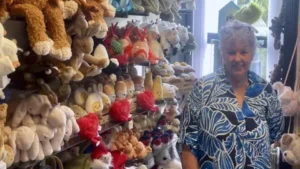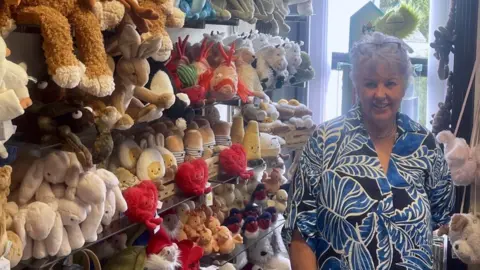In the world of plush toys, Jellycat has long been a cherished name among consumers, especially through its offerings like cute, soft stuffed animals. However, recent developments have left independent shop owners disillusioned and confused as Jellycat has decided to cease supplying roughly 100 independent retailers in the UK. This decision has sparked grave concerns, highlighting the delicate balance between large-scale retailers and smaller businesses in the toy market.
Joe Orrell, the manager of Rumours, a gift shop located in Whitby, North Yorkshire, expressed his disbelief when he received the email from Jellycat notifying him of their decision to stop supply. Orrell has witnessed the brand’s plush toys occupy significant retail space within his shop for over two decades, contributing immensely to its yearly income. The abruptness of Jellycat’s announcement left him feeling devastated, as he pointed out that sales from their toys represented a substantial portion of his shop’s revenue.
In a similar vein, Alison McCabe, owner of Puddleducks, a children’s clothing store in Diggle, spoke about her loyalty to Jellycat over nearly 20 years of stocking their products. However, after facing difficulties in acquiring stock for months, she received a message from Jellycat indicating they would no longer provide products to her store. Other shop owners echoed the sense of frustration and disappointment, highlighting an experience where emails specifying Jellycat’s termination were sent en masse, showing little recognition for each individual store. This lack of personal engagement only amplified feelings of exclusion among the affected retailers.
In a public statement, Jellycat attempted to justify its cuts by emphasizing a strategy centered on brand elevation and careful stockist selection. The company acknowledged that it still supported around 1,200 independent retailers, though it expressed gratitude to the discontinued ones for their previous support. This has sparked criticism from store owners who emphasize the loyalty and foot traffic that had drawn customers to Jellycat products in the first place.
As the conversation expanded, it became clear that the surge in Jellycat’s availability and their newfound popularity—especially fueled by social media platforms like TikTok—seemed to favor larger retailers over independent shops. Many owners conveyed that Jellycat’s inventory became increasingly unpredictable, often arriving in small, incomplete shipments. Andrew Kenyon, co-owner of JAK Hanson, reiterated this sentiment, sharing that he would sometimes wait for months for certain products or receive only partial shipments, leaving him unable to meet the demands of customers traveling long distances to shop his store.
Charlotte Stray of Keydell Nurseries similarly underscored the frustrations of independent stores as they were relegated to the back of the queue for Jellycat’s coveted products. Despite Jellycat’s statements that they would strive to balance supply between independent and larger stores, the reality appeared to differ, leading store owners like McCabe to feel squeezed out of the market.
Furthermore, the emotional toll was palpable among shop owners as negative feedback from disgruntled customers poured in, with many expressing their disappointment over Jellycat’s decision to cut ties with local stores. Social media outrage reflected a community unwilling to let the upheaval go unnoticed, as consumers reevaluated their purchasing support for a brand that seemed to disregard the very independent retailers that helped build its reputation.
With comments flooding in from collectors and loyal customers alike, many expressed a range of sentiments, from disillusionment to understanding that independent shops would likely pivot toward stocking different brands. Despite the challenges faced, Joe Orrell remained optimistic about the future of his store, suggesting they would adapt and survive the loss of Jellycat’s stock.
In wrapping up, this incident illustrates the precarious nature of business relationships in the modern retail landscape, particularly within the toy industry. As they take stock of the implications of Jellycat’s decisions, independent shop owners face the challenge of adjusting to a new reality while striving to maintain the community ties and personal service that once made shopping local feel special. The evolution of retail, marked by challenges and opportunities for connection, will continue to shape the vibrancy of independent businesses moving forward.











